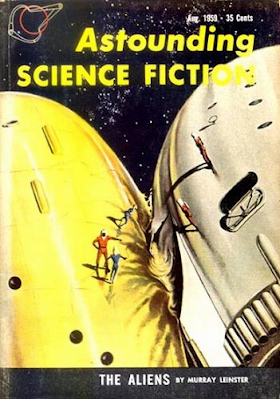
(Avon Books, August 1985, 0-380-89673-7, $9.95, 356pp, trade pb, anthology) Can be read here.
The 1955-56 Season
The 1956-57 Season
The 1957-58 Season
The 1959-60 Season
The 1962-63 Season
The 1963-64 Season
The 1964-65 Season
For whatever reason, this rather obvious project (an anthology of stories adapted by Alfred Hitchcock Presents: and The Alfred Hitchcock Hour) saw only one trade paperback edition from Avon, in 1985, toward the earlier years of the mass influx of Martin Greenberg anthologies, and coinciding with the 1985 latter-day revival of Alfred Hitchcock Presents: (one season broadcast on NBC, then three more seasons cablecast on the USA Network channel); the acknowledgements pages are misleading, and verge on useless, but, happily, along with Henry Slesar's introduction to the volume, the living and game writers (for some reason, Ray Bradbury chose not to) supplied brief but useful or at least interesting notes about the fiction and its adaptation, even when (as with Stanley Ellin), the writer in question has no clear firsthand memory of the adaptation (or, in his case, even seeing it). Co-editor Francis Nevins supplies afterwords for those writers who were already gone or unwilling (even John D. MacDonald, still ticked in 1985 that Shamley Productions had the odd idea of flanging together his story with one of the same title by Charles Runyon for that script, is game to let us know about this; Runyon not much less puzzled, but happy enough to get the check).
At least two of these stories had also made their way into "Hitchcock" anthologies I'd read in the '70s, Robert Bloch's 1961 story "A Home Away from Home" (Bloch notes that he enjoyed expanding the brief short story, an Alfred Hitchcock's Mystery Magazine Poe-inspired-contest-winner, when adapting it for the AH Hour adaptation; Bloch would also employ a version of the story as the framing device for his later anthology film-script for Asylum), in Alfred Hitchcock's Noose Report (1966), one of the Dell paperbacks which were essentially best-ofs from AHMM, and Harry Muheim's "The Dusty Drawer", which leads off Robert Arthur's brilliant 1969 anthology for Random House, Alfred Hitchcock Presents: A Month of Mystery (online here), as well as the Dell paperback first-volume (of 2) reprint, AHP: Dates with Death.
A book well worth having, as well as reading, even given the odd skipping through the seasons of the original television series. One wonders if there was some intention on the part of the editors to make a more comprehensive survey of the stories adapted for the program. Additionally, it's not the worst survey of the sorts of crime fiction one could find in magazines in the (for the most part) 1950s and '60s.
Jack Seabrook corrects Muheim's memory of the previous television adaptation of his "The Dusty Drawer" in his review of the AHP: episode and, in passing, this anthology in this Bare Bones post.





